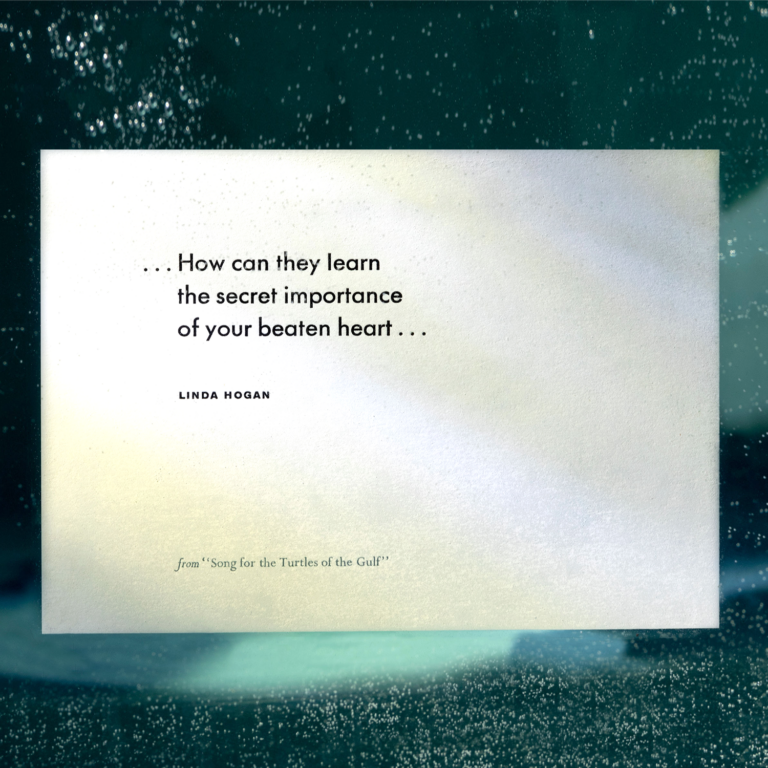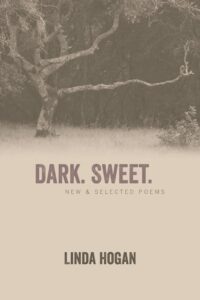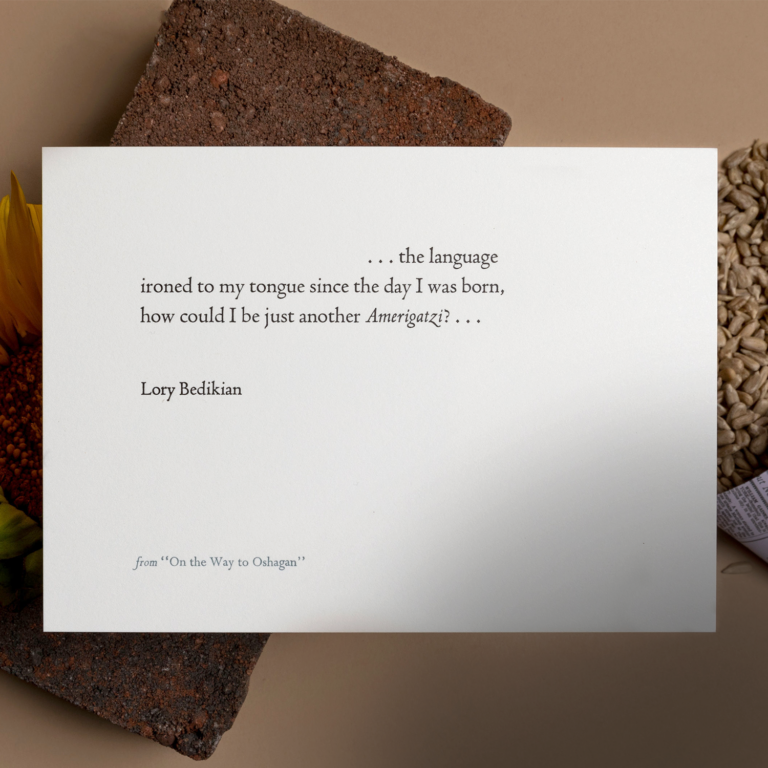Linda Hogan
Song for the Turtles of the Gulf
In a poem called a “Song,” Linda Hogan crafts a song for turtles and other creatures killed through oil spills in the gulf. At once a praise song for the beauty of the sea, the earth, and its animals, this song also functions as a lament: for the history erased by industrial practices; for the lack of respect and love for living breathing other-than-human lives; for plastic and the plastic containers used to hold the body of a dead sea turtle. The poem veers towards a prayer, too, begging forgiveness for being “thrown off true.”

Letterpress prints by Myrna Keliher | Photography by Lucero Torres
Guest

Linda Hogan is a Chickasaw novelist, essayist, and environmentalist. She earned an undergraduate degree from the University of Colorado-Colorado Springs and an MA in English and creative writing from the University of Colorado-Boulder. Her books of poetry include Dark. Sweet., The Book of Medicines, Seeing Through the Sun, and many more.
Transcript
Pádraig Ó Tuama: My name is Pádraig Ó Tuama, and a few years ago I taught a week at a Lutheran retreat center in Washington state, called Holden Village. It’s up in the Cascades. It’s overwhelming. I saw a bear within the first half-hour of being there. And all around, in the middle of this extraordinary, almost alpine beauty, there was the smell of smoke in the air. And it was the first time in my more recent life when I was moved to try to write something that was about what I could see, but also about the threat that lurked underneath, and not a threat indigenous to the Earth — a threat imposed on the Earth by people.
[music: “Praise the Rain” by Gautam Srikishan]
“Song for the Turtles of the Gulf” by Linda Hogan:
“We had been together so very long,
you willing to swim with me
just last month, myself merely small
in the ocean of splendor and light,
the reflections and distortions of us,
and now when I see the man from British Petroleum
lift you up dead from the plastic
bin of death,
he with a smile, you burned
and covered with red-black oil, torched
and pained, all I can think is that I loved your life,
the very air you exhaled when you rose,
old great mother, the beautiful swimmer,
the mosaic growth of shell
so detailed, no part of you
simple, meaningless,
or able to be created
by any human,
only destroyed.
How can they learn
the secret importance
of your beaten heart,
the eyes of another intelligence
than ours, maybe greater,
with claws, flippers, plastron.
Forgive us for being thrown off true,
forgive our trespasses,
in the eddies of the water
where we first walked.”
[music: “Ashed to Air” by Gautam Srikishan]
The first time that I read this poem, I remember feeling like I was brought into a moment of real stillness, and a mixture of lament and anger and concern, as well as extraordinary beauty. I kept on repeating “old great mother” to myself over and over, those words, “old great mother.” I don’t think I’d ever seen them put together like that before. And I found myself saying it again and again, recognizing the profound truth of it, and in those words of beauty, recognizing the deep lamentation and anger and accusation, really, that’s at the heart of this poem.
The poem is an elegy for this particular turtle, but also about many other turtles. It isn’t just about one. The poem is also an apology. The poem is almost an echo of a prayer, asking for forgiveness for these trespasses. The poem is also really and clearly locating the human enterprise in the eddies of the waters where we first walked. It’s saying we, too, are part of creation. We’re not dominant over it. We’re not everything about creation. We’re just one part of an entire swath of the created order of things. And it is seeking to locate us in our proper position and, in a certain sense, give a moral call, to say, Therefore, this is how you should act. It’s an ecopoem, in the sense of that it’s not just a poem about nature, it’s also a poem about how some nature — i.e., human nature — is causing terrible devastation to other forms of nature.
[music: “Margerie” by Blue Dot Sessions]
The reference to the “man from British Petroleum,” or B.P., in the poem gives a real, particular location of time in the context of this poem. Many people will remember the Deep Water Horizon spill that started in April 2010. It’s considered the largest marine oil spill in the history of the petroleum industry. There were 210 million gallons of oil discharged during 87 days. That took up 70,000 square miles — the size of Oklahoma. And it’s considered one of the most terrible disasters, environmental disasters. And it didn’t just start and stop in 2010. In 2013, almost 5 million pounds of oily material was taken from beaches in Louisiana — that was three full years after the event.
And then the causes are huge. There was a big, U.S. government investigation. One of the things that the U.S. investigation revealed and pointed towards was cost-cutting measures that had been put in place in the oil industry that then led to this spill. And in 2016, British Petroleum paid over $20 billion in fines. And so really, in terms of the particular area of the gulf as well as, then, all the life that’s there, all of the life that was surviving there, all of the survival tactics, all of the interruptions to habitat, the interruptions to water quality, the interruptions to marine life, the interruptions to plant life, all of this has been extraordinarily affected by that spill in 2010
And this poem is holding together this “old great mother,” who is being held with such respect, in a certain sense against humanity. And humanity is being represented by a few people. There’s the speaker of the poem, who was swimming with turtles only the month before. There seems to be an indication of a certain kind of symbiotic, possible relationship that’s being portrayed there. And then there’s this guy from B.P., who’s grinning as he holds up this dead turtle that had been carried along in a “plastic bin of death.” How awful. How terrible. And there’s this question, really, as we look at the two possibilities of being human presented in this poem as to: who do we wish to be, and how do we wish to be? What convenience-cutting measures do we wish to put into our life in order to make sure that this continues to be a world where such biodiversity can flourish?
[music: “ZigZag Heart” by Blue Dot Sessions]
So this poem really is an ecopoem. It’s a nature poem in the sense of that it’s describing nature, but an ecopoem is usually a poem that also describes threat, within the context of turning the gaze towards nature. Often, nature poems would use the world to talk about the mind of the poet. The mind of the poet might project what they’re feeling out into the wide world, and it’s a conversation, really, between the internal world of the poet and then the external world of nature.
But here, Linda Hogan is so insistent that in this ecopoem she’s not projecting her inner world into the external world of nature. Really, she’s critiquing the idea that nature’s there for humanity to project its internal chaos onto. Linda Hogan is looking at nature as nature: “the eyes of another intelligence / than ours, maybe greater.” She’s not seeing nature as a commodity. And she’s not commodifying the turtle or any other being. And she’s certainly critiquing the idea of the suffering that is being forced upon nature, that is utterly, utterly unnecessary.
And she’s critiquing that by recognizing that we, too, are part of nature. We, too, are from the eddies of the water. We are from this same habitat of nature that is the world. We are part of it. And she is, in a certain sense, de-escalating the way that human beings might seek to escalate ourselves in the created order of things. She’s revealing humanity’s inner life through the tension between a person swimming alongside turtles and a person grinning as they hold up a turtle killed by human industry. That’s how she’s revealing humanity and critiquing humanity. And really, she is leaving us with a question: what are you going to do?
[music: “Angel Tooth” by Blue Dot Sessions]
Linda Hogan addresses this turtle as “you.” And we see this mix of extraordinary honor to this turtle, “old great mother,” and then the comparison of that to the state that the turtle’s been left in after it’s died. It had burned. It was covered in oil. There had been burn fields created in the gulf to try to contain the oil. And while there were measures taken to try to protect certain animals from that, obviously those weren’t completely successful.
Linda Hogan toward the end has this extraordinary line: “Forgive us for being thrown off true.” And at its heart, this is a poem that has a moral center to it. The “us” in the “Forgive us” is the humans, and we’re being “thrown off true.” True what? True inhabiting the place where we are? True seeing ourselves for being part of nature and therefore having the co-responsibilities as part of nature, to allow nature to flourish, ourselves as well as everything around us?
[music: “An Accumulation” by Blue Dot Sessions]
This poem is filled with a wisdom of delight because it has a reminder of what’s possible, particularly at the start, when Linda Hogan speaks about “myself merely small / in the ocean of splendor and light, / the reflections and distortions of us.” There’s a desire in these lines, to see humanity among and alongside and with and permitted and small. There’s a celebration here, “splendor and light.” But there’s a hint, too, at who’s looking — “reflections and distortions of us.” Which distortions are we going to pay attention to, and who are we going to distort in the name of the imagination we have of what humanity’s place in the world is?
And this, I think, is the deep and profound invitation and intelligence and wisdom of this poem, which is to recognize that any ways within which we need to readjust our engagement with the world, inconvenient as some of those things might be, that those are for the purpose of being able to reorient ourself to being part of this splendid and beautiful and delightful way of being among nature that she’s presenting here. This is utterly demanding. And this is for the purpose of thriving and flourishing and delight and life.
[music: “Ashed to Air” by Gautam Srikishan]
“Song for the Turtles of the Gulf” by Linda Hogan:
“We had been together so very long,
you willing to swim with me
just last month, myself merely small
in the ocean of splendor and light,
the reflections and distortions of us,
and now when I see the man from British Petroleum
lift you up dead from the plastic
bin of death,
he with a smile, you burned
and covered with red-black oil, torched
and pained, all I can think is that I loved your life,
the very air you exhaled when you rose,
old great mother, the beautiful swimmer,
the mosaic growth of shell
so detailed, no part of you
simple, meaningless,
or able to be created
by any human,
only destroyed.
How can they learn
the secret importance
of your beaten heart,
the eyes of another intelligence
than ours, maybe greater,
with claws, flippers, plastron.
Forgive us for being thrown off true,
forgive our trespasses,
in the eddies of the water
where we first walked.”
[music: “Praise the Rain” by Gautam Srikishan]
Chris Heagle: “Song for the Turtles of the Gulf” comes from Linda Hogan’s book Dark. Sweet. Thank you to Coffee House Press, who gave us permission to use Linda’s poem. Read it on our website, at onbeing.org.
[music: “Praise the Rain” by Gautam Srikishan]
Poetry Unbound is: Gautam Srikishan, Erin Colasacco, Eddie Gonzalez, Lilian Vo, and me, Chris Heagle.
Our music is composed and provided by Gautam Srikishan and Blue Dot Sessions.
This podcast is produced by On Being Studios, which is located on Dakota land. We also produce other podcasts you might enjoy, like On Being with Krista Tippett, Becoming Wise, and This Movie Changed Me. Find those wherever you like to listen, or visit us at onbeing.org to find out more.
Books & Music
Recommended Reading
The On Being Project is an affiliate partner of Bookshop.org and Amazon.com. Any earnings we receive through these affiliate partnerships go into directly supporting The On Being Project.







